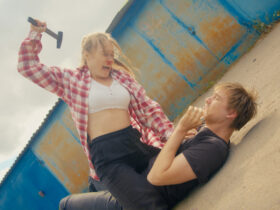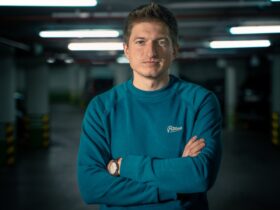- Was there a particular event or time that you recognized that filmmaking is your way of telling stories?
I realized quite young that I wanted to tell stories and have always had a huge love for cinema, I think it was when I saw ‘The Usual Suspects’ for the first time I realized just what an incredible tool filming making was and the stories it could tell. Then watching ‘Oldboy’ was the first time I truly told myself that I wanted tell stories myself
- Do you think it is essential to go to a film institute in order to become a successful filmmaker?
So I had a weird start as I didn’t go to film school, but actually snuck into a rather prestigious film school after working on a short with them, I would get thrown out each day and move to the next class room, eventually they gave in and started inviting me to talks etc and that was how I got to work on my first feature. In hindsight I would rather have tried to get into the industry much younger and just learnt on set
- Is it harder to get started or to keep going? What was the particular thing that you had to conquer to do either?
Both is hard, obviously, like anything everyone wants to do there is huge competition and huge commitment to keep going, I think if you want something enough you’ll never stop but it really is a life commitment. Directing is particularly hard and the drive to keep going against all the odds is always going to be tough but that’s what you have to do, and trying to keep your head in the right place to write and create can always be a struggle but as you work on bigger projects it becomes mildly easier having more creative HOD’s who get what it is you are trying to and understand how to achieve that.
- What was the most important lesson you had to learn that has had a positive effect on your film? How did that lesson happen?
Perseverance, I had some huge issues with the ‘suit’ which was the big reveal of the whole movie, we had concepts for a while and the costume designer said she understood what it was that we wanted, on the last day of the shoot, it turns up and is basically a wet suit with a fencing mask attached ha the fight scene we had choreographed for months and the suit was awful, anyway we shot the fight scene and it was really great but the suit didn’t hold up to the look of the rest of the film . And as we had not planned to have any VFX elements that day we had no markers on the suit. In short it took 7 years to get the 8 shots of the final suit reveal done, for free, by a few big post companies and VFX houses, I wanted to just put the film out there anyway a lot over the years but I’m happy with the final look we managed to get, but still unhappy the final fight never got into the cut Maybe down the line we will release a feature version of the film and get that fight put back in.
- What were the production realities from casting through editing that you had to accommodate?
How did you navigate those compromises or surprises and still end up with a cohesive film? Shooting the night for night scenes during the height of summer was tough, 6 hours of darkness to get everything you need ha
Due to having such a tight schedule I had to drop some smaller scenes that I missed and at one point had to direct 2 units at once in order to make sure we made our days
- What was the hardest artistic choice you made in the making of a film, at any stage in production?
Exposition. The film originally didn’t have the starting scenes explaining the past history of our world, I had flashbacks through out originally, I’m still not sure I made the right choice but we had some screenings with pretty big members of the industry and well if your audience doesn’t understand your story that can be the worst thing, so I had to bite my lip and spoon feed maybe more than I wanted.
- You are a collaborator. How have you discovered members of your team and how do you keep the relationship with them strong?
Especially with short form films, there is no money ha so even more so part of that is letting each HOD have their artist input and influence on the film, sometimes people don’t quite understand or get some aspects and you have to learn to be patient and figure out a way to explain it that maybe they will understand.
- What do audiences want? And is it the filmmaker’s role to worry about that?
Honestly, I don’t think the audiences know what they want, I think as a director you will worry about this whether you want to or not, but you also have to be humble enough to say the reason you are telling a story is to tell an audience and if an audience is just not getting that story, then what are you really doing?
- What role have film festivals played in your life so far? Why are they necessary? How do you get the most out of them?
Film Festivals are hard! The networking side is incredible and making those connections is amazing. I make cinematic films to be watched and film festivals offer you a platform for people to see your work and experience it as you intended
- Do you believe that a filmmaker should be original and fresh or he/she should stick to classic but safe cinema style?
I think you should tell a story how you feel is the right way to tell a story, there isn’t much that is truly original anymore but as the technology changes people will always find new creative ways to use it and tell a story and for that’s pretty exciting.





















